Elaborating on the state of cricket in the U.S., president of the world’s first Cricket Hall of Fame (CHOF), Michael Chambers, said that with the advent of Cricket Council USA (CCUSA) located in Florida and the American Cricket Federation, the sport, the second most popular in the world, has arrived in America.
Chambers, the keynote speaker at the Presidential Banquet which concluded the 27th Biennial Convention of the West Indies Cricket Umpires Association (WICUA) held at the Radisson Hotel in New York, Friday, July 24, praised the association for the leadership role that it is playing.
I am pleased with what you are doing, he said, then pleaded with them to continue their good work and requested that they reach out to the West Indies Cricket Board (WICB) in an effort to train their leadership how to work with the U.S. cricket stakeholders to help with the development of the game in the U.S.
“With sponsors such as Bedsessee Sporting Goods, the role of the Hall of Fame, the United States of America Cricket Umpires Association (USACUA) who are officiating at the games, the United States of America Cricket Association (USACA) and ACF who are providing governance, and the CCUSA promoting the game, yes the game has arrived in the U.S.,” he said.
Chambers, who is also president of the Sportmen’s Athletic Club in Hartford, Connecticut, and honorary president of the CCUSA, spoke briefly about the history of the game in the U.S. informing that the first international game of the sport was played between the U.S. and England in Hoboken, New Jersey in 1859.
He said that he was somewhat disappointed by the low number of U.S. league presidents present at the function, then paid tribute to Cliff Roye, president of the Metropolitan Cricket League, for being the only one in attendance.
Crediting present president of USACA Gladstone Dainty for his attempts to help develop the game in the country, Chambers said that they have been playing the game in the U.S. for more than 150 years, but it did not come under any real organization until 1965, when a very interested enthusiast of the sport, John Marder, got some of his colleagues together and organized the U.S. association.
Speaking about the association’s link with the International Cricket Conference (ICC), Chambers quickly pointed out that from information he retrieved from the internet encyclopedia Wikipedia, ICC was not in favor of the USACA becoming a part of the international cricket scene. “It is therefore not surprising,” he said, “that USACA has been underfunded for many years, which as a result has made them not able to develop cricket in the USA,” he said.
“We see women’s cricket moving and youth cricket in New York forging ahead under the leadership of Commissioner Chris Thompson,” he stated. “In December, Lauderhill will once again host the largest T20 tournament in the world, thanks to CCUSA,” he said.
Talking about the existence of the Hall of Fame, which was created to be used as a vehicle through which individuals who contributed to the growth and development of the game in the U.S., Canada and around the world could be honored, he thanked the members of the USACUA for their input to the institution that helped to define how individuals were selected for induction. Recognizing Hall of Famers Mohamed Baksh and Lloyd Dixon, who were present, he said that the institution which was organized in 1980, held its first Induction Ceremony in 1981.
At the gala affair which was sold out, New York State Assemblyman N. Nick Perry welcomed the visitors who came from 10 Associate Caribbean and West Indian countries. President of the WICUA expressed how pleased he was with the events associated with the convention and the attendance at the function and thanked host the USACUA for a job well done.
The evening ended with General Secretary Vivian Johnson making presentations and awards to those individuals who had successfully completed their examinations as umpires.
